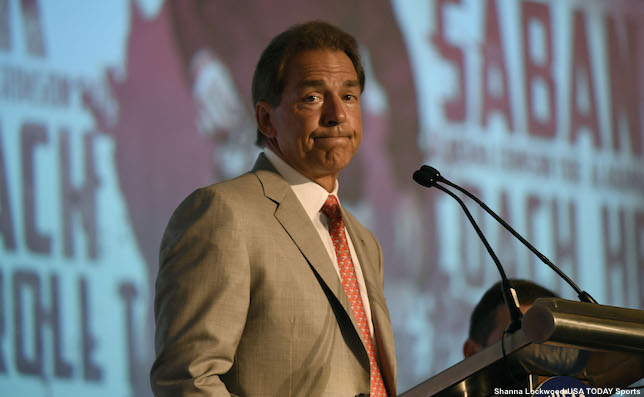While the 2015 college football season is still more than a month away, the Power 5 conferences are already holding their respective preseason Media Days. That's right, "days," as in plural, because one day of hobnobbing with the media just won't do.
Leading off the festivities of course is the SEC, the biggest, baddest, and also richest conference -- the first among equals. And of course its Media Days stretched over four days, just so we don't miss a single soundbite coming out of Nick Saban.
But what did we learn exactly about the SEC and its teams from the gabfest? Here's our quick review -- the first of five as we work our way through each conference in the next couple of weeks.
1. Nick Saban did a lot of whining, but what's the ulterior motive?
Never one to practice economy of words, Saban likes to talk. The Alabama coach did a lot of talking -- and complaining -- during the Media Days. Starting with his displeasure with satellite camps (chief target: Michigan's Jim Harbaugh) and "level playing field" and then with his weak explanation about why the Tide lost to Ohio State in the national semifinals last year. He blamed it on his players worrying about their NFL draft status.
But the most curious thing Saban did was expressing his admiration for the NFL, a league in which he spent only two seasons as a head coach and that was nearly a decade ago. Maybe he's just sniping at the NCAA, but maybe there's more to it than that?
2. SEC takes on the Rebel flag of the Confederacy
The Stars and Bars flag is very much in the news of late and the SEC coaches and administrators were asked about where they stand. Ole Miss's Hugh Freeze took a strong stance while his in-state rival Dan Mullen sidestepped the question. While the Confederate flag is not displayed in any official capacity on SEC campuses, it is still nonetheless embraced by a segment of their teams' fans.
Most of the players downplayed the question, choosing not to be involved in a political controversy. One notable exception is Ole Miss lineman C.J. Johnson, who said, "for me personally, growing up in Philadelphia, Mississippi, where there's been a lot of racism particularly in the (1980s) and early (1990s), I feel like it should come down. Although it represents some people's history, there are still a lot of people out there who use it to show hatred or ill will to other people."
3. Steve Spurrier still owns the podium
The Ol' Ball Coach turned 70 this year and retirement (and more golf) beckons. But for now he's not slowing down. "I breezed right through age 60, breezed right through 65, and I'm going to try my best to breeze right on through 70. I can still remember just about everything. ... I forgot to get fired and I'm not going to cheat."
But of course he couldn't help himself but to tweak the other coaches in attendance. Speaking of South Carolina's disappointing 7-6 season, Spurrier took his shots: "We were 7-6, the same as Tennessee, the same as Arkansas, and I think they're celebrating big seasons last season so we were celebrating also. We were doing cartwheels and high-fiving after that Independence Bowl game."

4. Greg Sankey has big shoes to fill
In Mike Slive's 12 years as the SEC commissioner, he took the conference to unprecedented heights. Not only did he make the SEC the premier football conference through the machinations of the BCS, he struck shrewd media deals that enriched the conference schools' coffers and made the right calls on expansion by adding Texas A&M and Missouri.
The task of maintaining that runaway success now falls to Greg Sankey, who maintains such a low profile that there's not yet a Wikipedia entry about him. Like Slive, Sankey is a native New Yorker who's nevertheless well immersed with the ways of the South, having joined the SEC office in 2002 and served as the Southland Conference commissioner for six years before that.
5. SEC is filthy rich, but money can't buy ...
According to Forbes, last year the SEC finally jumped the Big Ten as the most valuable conference in college sports. Each school raked in $34 million, ahead of the Big Ten's $28 million per and dwarves the payouts for the other three Power 5 conferences. A good chunk of it came from the media deals that included the launching of the SEC Network in 2013, a blockbuster deal Slive struck with ESPN.
But what the loaded Brinks trucks didn't bring is the championship trophy. The SEC failed to make the inaugural College Football Playoff championship game and now has been shut out of the national title for two years. If the SEC fails to claim the football championship for a third straight season, then all the talk about being the premier conference will start to ring really hollow, like how it used to be with the Big Ten.
-- Samuel Chi is the managing editor of RealClearSports.com and proprietor of PlayoffGuru.com. Follow him on Twitter at @ThePlayoffGuru.





